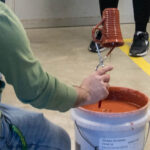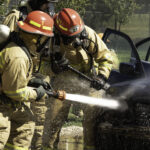“Here lies the motivation of a college student. May it rest in peace….” This is the obituary that many students read as they watch their motivation go up in smoke in the flames of student burnout. That smoke withers into the air and slips out of sight.
Student burnout is a raging fire that torches a student’s motivation and can end the student’s college career altogether. It scorches the college grounds with no mercy and takes any victim that it can. It is a fire that can be grueling to fight. The fatigue and frustration from the semester are the dry grass kindling for the burnout flames.
Student burnout is defined as a type of burnout due to extended academic stress. Burnout has symptoms such as lack of motivation or interest, impaired ability to focus, physical health issues, lack of creativity, fatigue and decreased academic performance. It can occur at any time throughout the year. All different kinds of things can trigger student burnout. It could be receiving lower grades than usual, moving away from your hometown, choosing a major, struggling with making new friends, competing with your peers, struggling with student debt, having a heavy workload and many more things. It can even be a combination of any of these.
Fighting student burnout can be an uphill battle. It has a snowball effect on a student’s life, but there are ways to cope with and reverse it. Some of the best ways to cope with student burnout are taking breaks, meditating, seeking help if you need it and trying hobbies. Taking small breaks throughout the day can be beneficial to prevent overworking. Meditation is a great technique for decreasing stress and relaxing the mind. It can help slow down those racing thoughts and refresh the mind.
When more severe symptoms occur, seeking help is especially crucial. Student burnout can lead to other illnesses such as depression, the flu and respiratory sicknesses. Getting help from a counselor, trusted friend or family member or even your general practitioner can make a huge difference in the coping process. Hobbies are also a great coping mechanism because they can help distract a student from stress for a period of time. Taking part in hobbies that you enjoy can help restore some of the creativity that is lost during student burnout.
If the burnout is severe enough, these methods might not be helpful. When the fatigue and depression of academic stress take over a student, sometimes the best measure is to step back and recover. This is a process that is best begun by physically taking a break from academics.
If possible, you must find a time when you can avoid academics altogether. During that time, prioritize health and well-being. Focus on spending time with people that bring you joy, getting extra rest, eating nutritious meals and maybe getting some physical exercise. Healing from student burnout can be a lengthy process but it takes time to recover from burns. The deeper burns require more healing.
Categories: Opinion, Staff Editorials










